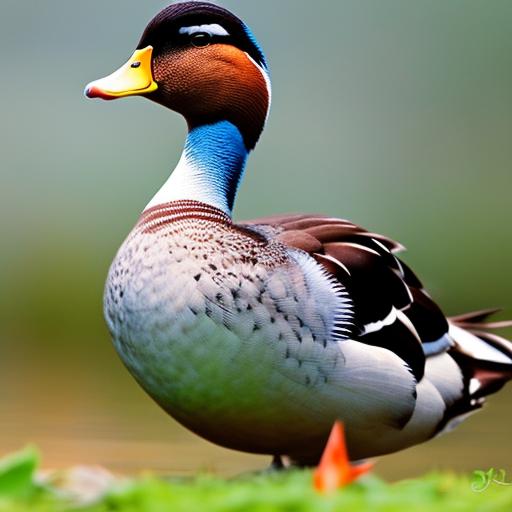Quiet duck breeds are a specific type of duck breed that are known for their calm and quiet nature. Unlike other duck breeds that can be loud and noisy, quiet duck breeds are much more peaceful and serene. They are ideal for people who live in residential areas or have neighbors close by, as they do not create a disturbance with their noise.
There are several reasons why people may want to consider raising quiet duck breeds. Firstly, their calm and quiet nature makes them easier to handle and manage. They are less likely to become stressed or agitated, which can make them easier to train and handle. Additionally, their quiet nature makes them more suitable for families with young children or individuals who prefer a quieter environment.
Key Takeaways
- Quiet duck breeds are those that produce less noise than other breeds, making them ideal for backyard farms and urban areas.
- The top 5 quiet duck breeds for backyard farms are the Swedish, Cayuga, Buff, Welsh Harlequin, and Ancona.
- Characteristics of quiet duck breeds include calm and docile personalities, smaller size, and less vocalization.
- Benefits of raising quiet duck breeds include less disturbance to neighbors, easier handling, and lower stress levels for the ducks.
- When choosing a quiet duck breed, consider factors such as egg production, temperament, and climate adaptability.
Top 5 Quiet Duck Breeds for Backyard Farms
1. Indian Runner Ducks: Indian Runner Ducks are known for their upright posture and distinctive running gait. They are a medium-sized breed that comes in a variety of colors including white, black, fawn, and chocolate. Indian Runner Ducks are not only quiet but also highly active and excellent foragers. They are great at controlling pests in the garden and can be trained to follow commands.
2. Khaki Campbell Ducks: Khaki Campbell Ducks are a popular choice for backyard farms due to their excellent egg-laying abilities. They are known for their calm and friendly nature, making them easy to handle and interact with. Khaki Campbell Ducks are also highly adaptable and can thrive in various climates.
3. Swedish Blue Ducks: Swedish Blue Ducks are a beautiful breed with striking blue plumage. They have a calm and gentle temperament, making them great for families with children or individuals who prefer a peaceful environment. Swedish Blue Ducks are also good layers of large white eggs.
4. Cayuga Ducks: Cayuga Ducks are known for their stunning iridescent black feathers that shimmer in the sunlight. They have a quiet and docile nature, making them suitable for backyard farms. Cayuga Ducks are also good layers of dark-colored eggs.
5. Welsh Harlequin Ducks: Welsh Harlequin Ducks are a small to medium-sized breed that comes in two color varieties – silver and gold. They are known for their calm and friendly nature, making them easy to handle and interact with. Welsh Harlequin Ducks are also good layers of white or cream-colored eggs.
Characteristics of Quiet Duck Breeds
Quiet duck breeds have several physical and behavioral traits that set them apart from other duck breeds. Physically, they tend to be smaller in size compared to other breeds, making them easier to handle and manage. They also have a more upright posture and a sleeker body shape, which contributes to their calm and quiet nature.
Behaviorally, quiet duck breeds are known for their docile and friendly temperament. They are less likely to become aggressive or territorial, which makes them easier to handle and interact with. Quiet duck breeds are also less likely to engage in excessive vocalization, which can be a nuisance in residential areas.
Benefits of Raising Quiet Duck Breeds
There are several advantages to raising quiet duck breeds over other breeds. Firstly, their calm and quiet nature makes them more suitable for residential areas or farms with close neighbors. They do not create a disturbance with their noise, making them more compatible with a peaceful environment.
Secondly, quiet duck breeds are generally easier to handle and manage due to their docile temperament. They are less likely to become stressed or agitated, which can make them easier to train and handle. This can be especially beneficial for families with young children or individuals who prefer a quieter environment.
Lastly, quiet duck breeds can still provide the same benefits as other duck breeds, such as egg production and pest control. Many quiet duck breeds are excellent layers of eggs, providing a sustainable source of fresh eggs for the farm or household. They are also good at controlling pests in the garden, reducing the need for chemical pesticides.
How to Choose the Right Quiet Duck Breed for Your Farm
When choosing a quiet duck breed for your farm, there are several factors to consider. Firstly, consider the size of the breed and whether it is suitable for your available space and resources. Smaller breeds may be more suitable for backyard farms with limited space, while larger breeds may require more room to roam.
Secondly, consider the purpose of raising ducks on your farm. If you are primarily interested in egg production, choose a breed that is known for its excellent egg-laying abilities. If you are more interested in pest control or ornamental purposes, choose a breed that is known for its foraging abilities or striking appearance.
Lastly, consider your personal preferences and lifestyle. Some quiet duck breeds may require more attention and interaction, while others may be more independent. Consider how much time and effort you are willing to invest in raising ducks and choose a breed that matches your needs and preferences.
Housing and Feeding Requirements for Quiet Duck Breeds

Quiet duck breeds have similar housing and feeding requirements as other duck breeds. They require a secure and spacious enclosure that provides protection from predators and the elements. The enclosure should also have access to clean water for swimming and drinking.
In terms of feeding, quiet duck breeds require a balanced diet that consists of commercial duck feed supplemented with fresh fruits, vegetables, and insects. It is important to provide them with a varied diet to ensure they receive all the necessary nutrients. Additionally, access to fresh water should be available at all times.
Health and Care of Quiet Duck Breeds
Quiet duck breeds are generally hardy and resilient, but they still require proper care and attention to maintain their health. Regular veterinary check-ups are recommended to ensure they are in good health and to prevent any potential health issues.
Common health issues that can affect quiet duck breeds include respiratory infections, parasites, and foot problems. It is important to provide them with a clean and dry environment to prevent these issues. Regular cleaning of their enclosure and providing them with fresh bedding can help maintain their health.
Basic care and maintenance of quiet duck breeds include regular grooming, such as trimming their feathers and nails, as well as providing them with regular exercise and mental stimulation. They also require access to clean water for swimming and bathing, as this helps keep their feathers clean and healthy.
Breeding and Hatching Quiet Ducklings
Breeding and hatching quiet ducklings can be a rewarding experience. To breed quiet duck breeds, it is important to have a male and female of the same breed. Provide them with a suitable nesting area that is secluded and protected from predators.
The female will lay eggs in the nesting area, and it is important to provide her with a comfortable and safe environment during this time. The eggs will need to be incubated for a specific period of time, depending on the breed. It is important to monitor the temperature and humidity levels during the incubation process to ensure successful hatching.
Once the ducklings hatch, they will need to be provided with a warm and secure brooder area. This area should have access to food and water, as well as a heat source to keep them warm. It is important to monitor their health and provide them with proper care during this critical stage.
Common Misconceptions About Quiet Duck Breeds
There are several common misconceptions about quiet duck breeds that need to be clarified. Firstly, some people may believe that quiet duck breeds are less productive or have lower egg-laying abilities compared to other breeds. However, many quiet duck breeds are excellent layers of eggs and can provide a sustainable source of fresh eggs.
Secondly, some people may believe that quiet duck breeds require less care and attention compared to other breeds. While they may have a calmer temperament, they still require proper care and attention to maintain their health and well-being. Regular veterinary check-ups, grooming, and a balanced diet are still necessary.
Lastly, some people may believe that quiet duck breeds are less adaptable or versatile compared to other breeds. However, many quiet duck breeds are highly adaptable and can thrive in various climates and environments. They can still provide the same benefits as other duck breeds, such as pest control and ornamental purposes.
Is a Quiet Duck Breed Right for You?
In conclusion, raising quiet duck breeds can be a great option for individuals who prefer a calm and peaceful environment. They have several advantages over other duck breeds, including their calm and friendly nature, ease of handling, and suitability for residential areas.
When choosing a quiet duck breed for your farm or backyard, consider factors such as size, purpose, and personal preferences. Provide them with proper housing and feeding requirements, as well as regular health care and maintenance.
Overall, raising quiet duck breeds can be a rewarding experience that provides numerous benefits for your farm or lifestyle. Consider adding them to your flock and enjoy the tranquility they bring to your farm or backyard.
If you’re looking for quiet duck breeds to add to your backyard flock, you may also be interested in turning a shed into a chicken coop. This article from Poultry Wizard provides helpful tips and step-by-step instructions on how to transform a shed into a comfortable and functional space for your chickens. By following this guide, you can create a peaceful environment for your ducks and ensure they have a cozy home. Check out the article here for more information.
FAQs
What are quiet duck breeds?
Quiet duck breeds are those that produce less noise compared to other breeds. They are ideal for backyard or urban farming where noise levels need to be kept low.
What are some examples of quiet duck breeds?
Some examples of quiet duck breeds include the Indian Runner, Khaki Campbell, Welsh Harlequin, and Swedish Blue.
What are the benefits of raising quiet duck breeds?
Raising quiet duck breeds can be beneficial for those who live in urban areas or have close neighbors. They produce less noise, which can help avoid complaints from neighbors. Additionally, they are easy to care for and can provide a source of fresh eggs and meat.
Do quiet duck breeds require special care?
No, quiet duck breeds do not require any special care compared to other breeds. They still need access to water, food, and shelter, as well as regular health check-ups and vaccinations.
Can quiet duck breeds be raised with other breeds?
Yes, quiet duck breeds can be raised with other breeds. However, it is important to consider the noise levels of the other breeds and ensure that they are compatible with the quiet duck breeds.
Meet Walter, the feathered-friend fanatic of Florida! Nestled in the sunshine state, Walter struts through life with his feathered companions, clucking his way to happiness. With a coop that’s fancier than a five-star hotel, he’s the Don Juan of the chicken world. When he’s not teaching his hens to do the cha-cha, you’ll find him in a heated debate with his prized rooster, Sir Clucks-a-Lot. Walter’s poultry passion is no yolk; he’s the sunny-side-up guy you never knew you needed in your flock of friends!







